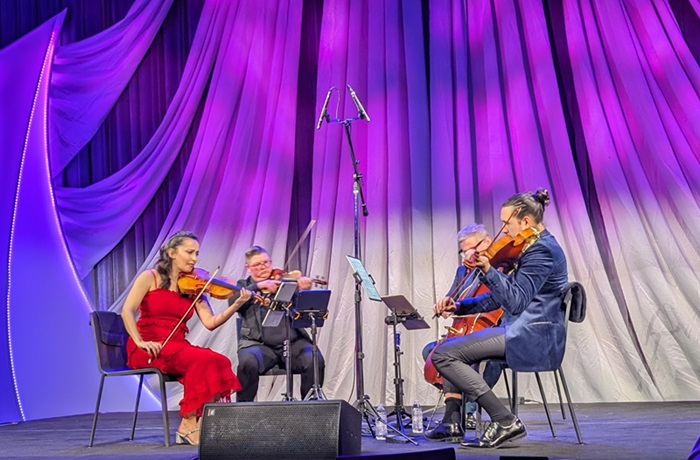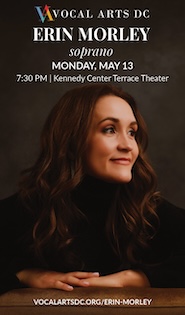Catalyst Quartet hones its contemporary edge in Studio K debut

The Catalyst Quartet played in Studio K at the Kennedy Center. Photo: WCR
The Catalyst Quartet returned to the Kennedy Center Thursday evening for its debut performance in the “club” at Studio K. Jennifer Koh, new director of the Fortas Chamber Music Concerts series, has made greater use of the annex known as The Reach. The move is echoed in the more recent repertory often being programmed, as well as in the unfortunate prevalence of amplification.
Ravel’s String Quartet in F Major, composed in 1903, stood as the oldest work on this contemporary-leaning concert. The four musicians made a cohesive, warm ensemble sound together in the first movement, where they were always willing to take time and cede the floor to one another. Abi Fayette, who took the top violin part on the first half, played with a small, elegant tone, noteworthy for its sweetness and clean intonation.
Cellist Karlos Rodriguez and violist Paul Laraia, by contrast, struggled with intonation issues in the second movement, generally set at a pleasing bouncy tempo. After an additional tuning recalibration, the third movement fared better, especially in the hushed sound the quartet made with mutes on the strings. The rapidly paced Finale, taken fast enough to give the right sense of agitation, rounded out a good, if not excellent performance of this rather familiar work.
The rest of the evening represented a sort of career retrospective for the Catalyst, who celebrated their tenth anniversary in 2020. The next two works on the program came early in their time together, beginning with Terry Riley’s Sunrise of the Planetary Dream Collector, a piece created for the Kronos Quartet in 1982. It relies on the musicians to choose how the musical bits Riley laid out get grouped together.
The performers spelled out their group’s name in the ordering of sections, something that would not be apparent to the listener without an explanation. The drawback of the piece is that it never really leaves its home key area, which gets dull fairly quickly, something akin to Pachelbel’s Canon in D with less melodic and harmonic variation. This rendition, which lasted a bit longer than ten minutes, did not surmount that problem either.
Anton Webern’s Langsamer Satz, the first piece that the Catalysts ever performed together, proved the highlight of the night. The violinists switched positions, putting Karla Donehew Perez on the first violin part, where her broader tone served this seething late romantic love song beautifully. All four musicians sounded more comfortable as well, producing a warm ensemble sound, especially in the softest moments.
The musicians presented their decision to perform 4’33”, John Cage’s silent etude, as a way to assess the passage of musical time. The piece is no less puzzling and gimmicky than it was at its premiere, but the Catalysts took it as seriously as they could. The “movements,” normally marked only by their duration, came across in the addition of personnel: with the first violinist and cellist on stage for the opening, the subsequent movements added the violist and then the second violinist, to no audible effect, of course. (What one learned principally from the experience was just how noisy the venue’s air handler is.)
The program concluded with a different understanding of the duration of a couple minutes. The Catalysts commissioned a group of composers to contribute a brief movement each to a work called CQ Minute. The inspiration came from YouTube, where statistics showed that most viewers would not watch any video longer than a minute or two. While the process does not sound like it would yield something worth focusing on, some of the movements succeeded.
Some composers turned to traditional ideas that might be fairly brief in a conventional string quartet. Kishi Bashi’s “Con Brio” opened with a vigorous fugato, not extended much beyond that, while Billy Childs’ “The Face of Fast Regret” came across like a serious slow movement, quite promising in its melodic and harmonic writing. Jessie Montgomery’s “Build” consisted entirely of a long crescendo.
Paquito D’Rivera’s “But, Just a Minute?!” reached too far, busy textures set at a harried pace, trying to pack in a lot. Andy Akiho’s “Presidio” went the opposite direction, a mostly pizzicato bagatelle that aimed mainly at being lively and fun. In “Emerge,” Kevin Puts laid out a slender series of slow-moving tonal chords. Angélica Negrón’s “Lo infinito” proceeded along similar lines, but with some ear-piercing dissonance added for spice.
Rhythmic or textural effects enlivened some of the movements, like the crescendo-decrescendo waves on held chords in Caroline Shaw’s “Bittersweet synonym” or shifts of irregular meter in Nick Revel’s “Time Capsule.” Most composers used the instruments equally, perhaps not to use up too much time on solos, except for a cello solo in Paul Mekailian’s “A future in process.”
Little surprise that the most polished of all eleven movements came from veteran composer Joan Tower. Her piece “A short flight,” placed near the heart of the suite, sounded like a devilish scherzo, with some dissonant menace thrown in, reminiscent of Prokofiev or Shostakovich. It was the only piece in the set that sounded complete, standing on its own and needing no further explanation.
Imani Winds will perform music by Scott, Shorter, D’Rivera, Coleman, Okpebholo, and Medaglia 7:30 p.m. April 3 in the Terrace Theater. kennedy-center.org



